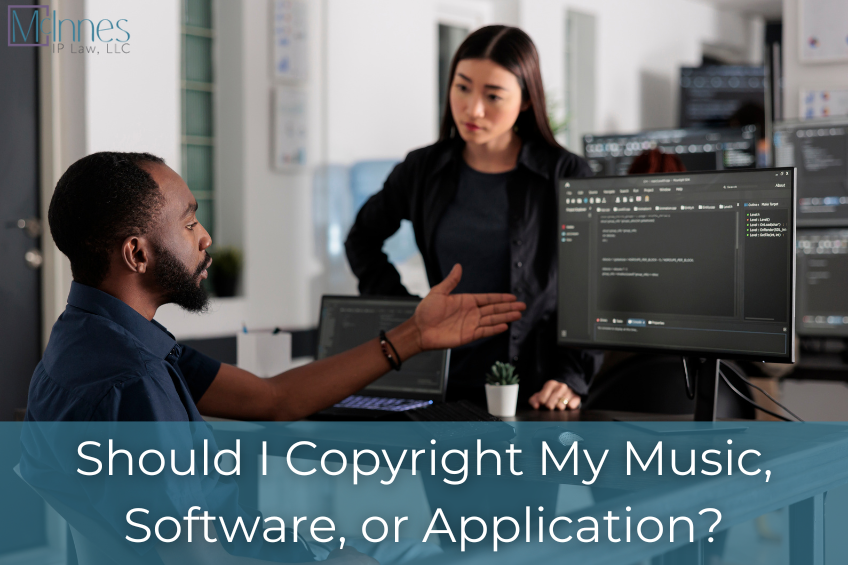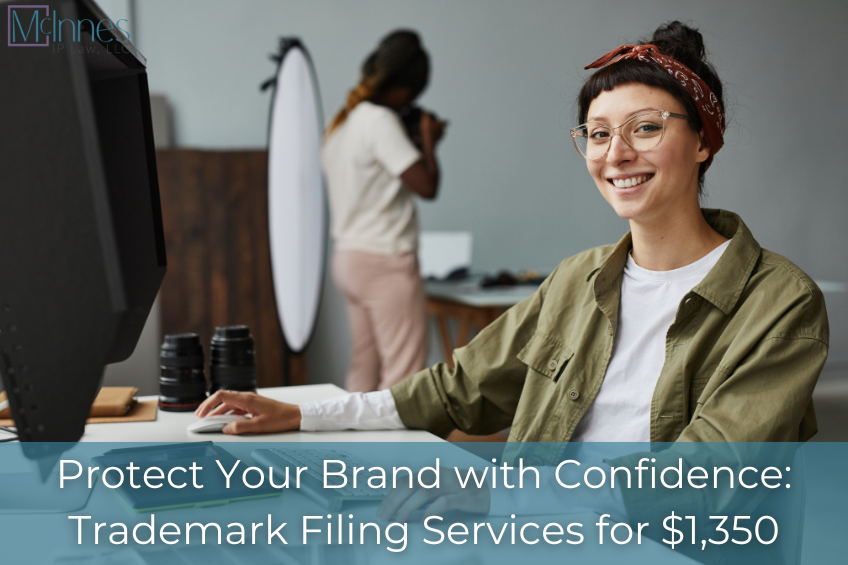Whether you’re a musician releasing your first album or a developer launching a groundbreaking app, protecting your creative work is crucial. One of the most powerful tools available to creators in the U.S. is copyright law, but do you really need to register your work with the U.S. Copyright Office?
In this blog, we’ll break down what copyright protects, why registration matters, and the specific considerations for music and software creators alike.
What We’ll Cover:
- What is copyright?
- Do I automatically have copyright?
- Why register my music?
- Why register my software or app?
- 3 common misconceptions about copyright law
- When should I register?
- How do I register?
- Key takeaways
- Legal representation
What Is Copyright?
Copyright is a form of intellectual property protection granted by law to the creators of “original works of authorship,” including literary, musical, and artistic works, among others. For creators of music and software, this typically includes:
- Music: Lyrics, melody, sound recordings, compositions
- Software: Source code, object code, user interfaces, technical documentation
Copyright gives you exclusive rights to:
- Reproduce the work
- Distribute copies
- Perform or display the work publicly
- Create derivative works
These rights apply automatically upon creation, but there’s a big catch: if you want to enforce your rights in court, you must register your work with the U.S. Copyright Office first.
Do I Automatically Have Copyright?
Yes. In the U.S., copyright protection exists the moment your original work is fixed in a tangible medium—that means once your music is recorded or your code is written, it’s protected.
But automatic protection only goes so far. Without a Registration:
- You can’t sue someone in federal court for infringement.
- You can’t claim statutory damages (which can be up to $150,000 per infringement).
- You can’t establish a public record of ownership.
In other words, you technically have copyright, but no real legal teeth to protect it.
Why Register My Music?
If you’re a musician or music producer, here are the top reasons to register your songs:
1) Proof of Ownership
Registration provides an official record that you created the work. This proof can be invaluable if there’s ever a dispute over who owns the rights to a song.
2) Infringement Lawsuits
You must register your work before you can file a copyright infringement lawsuit. If someone samples your beat without permission, you need a registration to take legal action.
3) Statutory Damages and Attorneys’ Fees
If your music is registered before (or within 3 months of) publication, you may be eligible for:
- Statutory damages: Up to $150,000 per willful infringement
- Reimbursement of attorney’s fees. This payout can make a huge difference in whether it’s financially worth going after infringers.
4) Commercial Opportunities
Music publishers, streaming platforms, licensing agencies, and sync partners often prefer or require that your work be registered. It makes doing business with your content much smoother.
Why Register My Software or App?
If you’re a software developer or app creator, copyright protection offers unique advantages:
1) Protecting Source Code
The source code you write is considered a “literary work” under copyright law. Registration protects against unauthorized copying or use of your code, especially important if your code has commercial value.
2) Preventing Clones
While copyright doesn’t protect ideas or functional aspects (that’s the realm of patents), it does protect the exact structure, organization, and expression of your code. If someone copies large parts of your interface, layout, or codebase, you’ll have recourse—if you registered.
3) Investor and Business Credibility
For startups and app developers, registered copyrights can strengthen your business case to investors, partners, or acquirers. It shows you’re taking IP protection seriously.
4) Litigation & Enforcement
Just like with music, registration gives you access to federal court, statutory damages, and attorneys’ fees—powerful tools if someone lifts your app or code.
Do You Need Legal Representation for a Copyright?
3 Common Misconceptions About Copyright Law
1) “I mailed myself a copy of the work, so I’m protected.”
This reference is called the “poor man’s copyright,” and it does not hold up in court. Only formal registration counts.
2) “My work is copyrighted because it has a © symbol.”
The symbol is useful to notify others of your rights, but it doesn’t create or enforce them. Registration is still necessary for serious legal protection.
3) “I don’t need copyright—I’ll just use a trademark or patent.”
Different forms of IP protect different things:
- Copyright: Expression (music, code, text)
- Trademark: Brand identity (logos, names)
- Patent: Inventions and functionality. You may need all three depending on your goals.
When Should I Register?
Ideally, as soon as possible—especially before:
- Publishing your work publicly
- Sharing it with collaborators
- Uploading it to a platform
- Pitching it to labels, studios, or investors
In fact, registering within 3 months of publication gives you the full range of protections (including statutory damages), even if the infringement happens later.
How Do I Register?
Registering a copyright in the U.S. is straightforward and affordable compared to most forms of intellectual property. The process typically involves submitting an online application through the U.S. Copyright Office, paying a modest filing fee, and uploading a copy of the work being protected. While many creators attempt to file on their own, working with an IP attorney helps avoid common mistakes, ensures the work is properly classified, and supports a broader protection strategy as your project grows.
Key Takeaways
-
Copyright protection exists automatically when your music or software is created, but registration is required to enforce your rights in court.
-
Without registration, you cannot sue for infringement, seek statutory damages, or recover attorneys’ fees.
-
Registering music or software strengthens ownership proof, deters copying, and supports licensing and monetization.
-
Early registration, especially within three months of publication, unlocks the strongest legal protections.
-
Copyright registration adds business and investor credibility, particularly for musicians, startups, and app developers.
-
Common shortcuts like mailing yourself a copy or using a © symbol do not replace registration.
-
For creators serious about protecting and monetizing their work, copyright registration is a practical necessity, not a formality.
Legal Representation
From legal protection and customer trust to brand expansion and monetization, the benefits of registering a copyright are far-reaching. If you’re investing time and money into creating music or software, make sure that it remains uniquely yours.
If you’re serious about protecting what you’ve built, copyright registration isn’t just a formality—it’s a necessity. Call (774) 234-1256, email us at info@mcinnesiplaw.com, or message us on our LinkedIn Company Page today to schedule your free copyright law consultation.
Disclaimer: This blog post is for informational purposes only and does not constitute legal advice. If you have specific legal questions about copyright registration, you should consult a qualified attorney.



